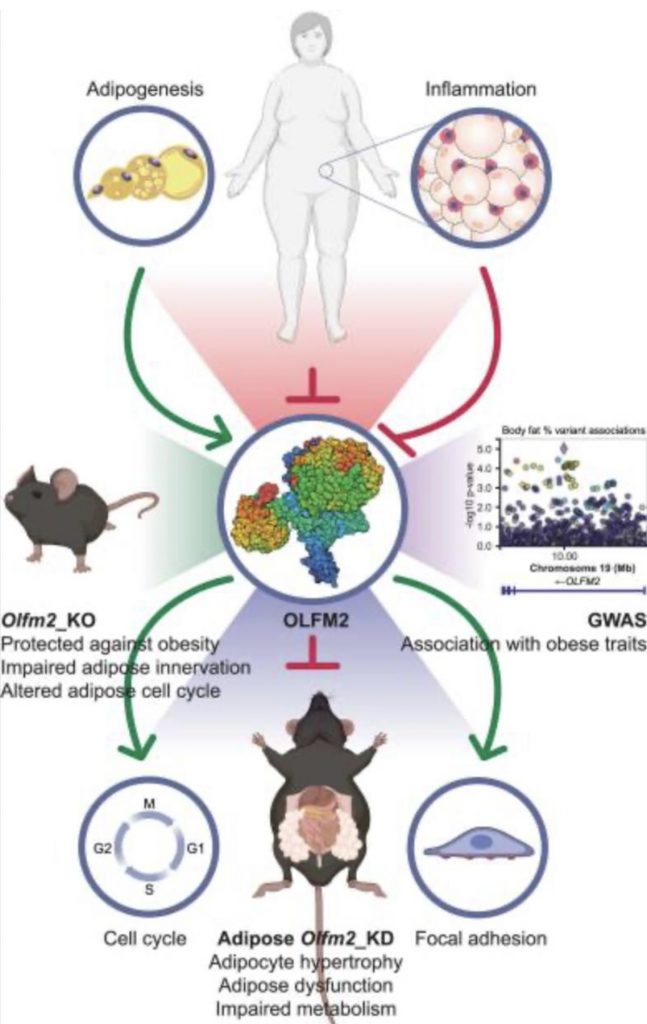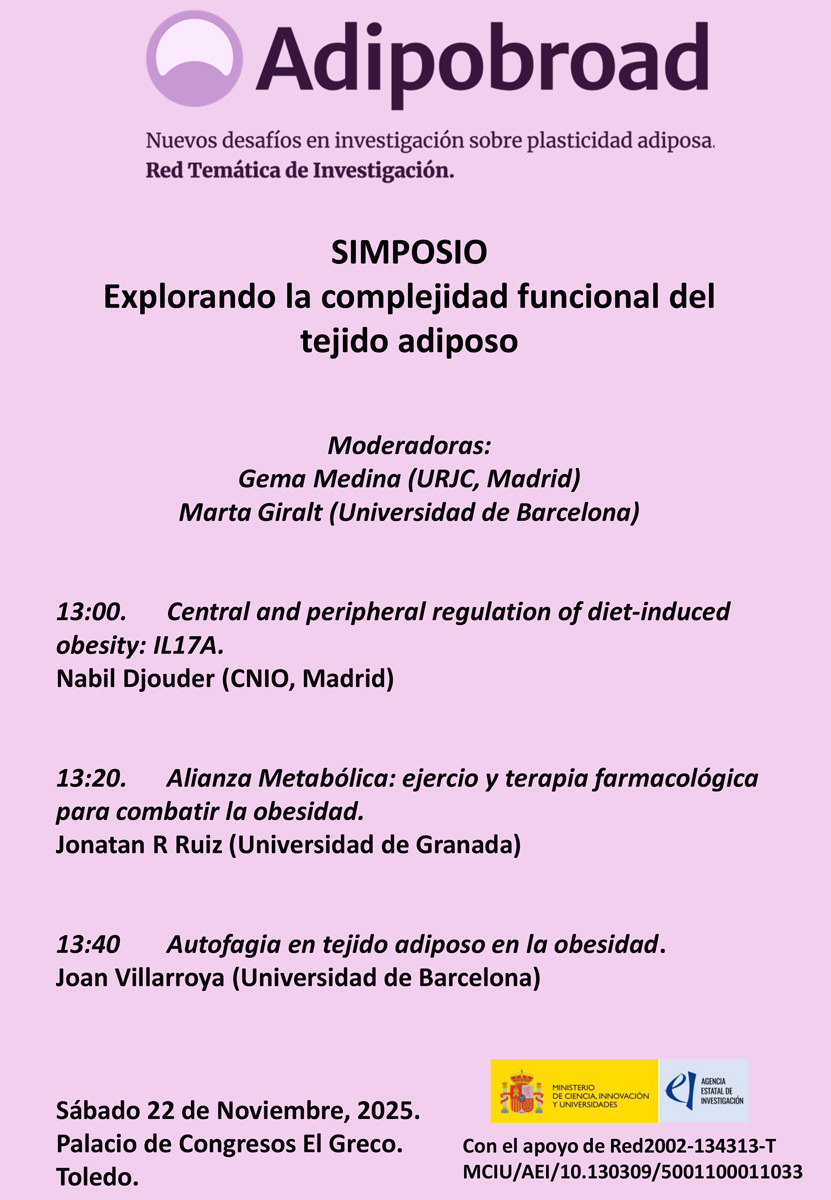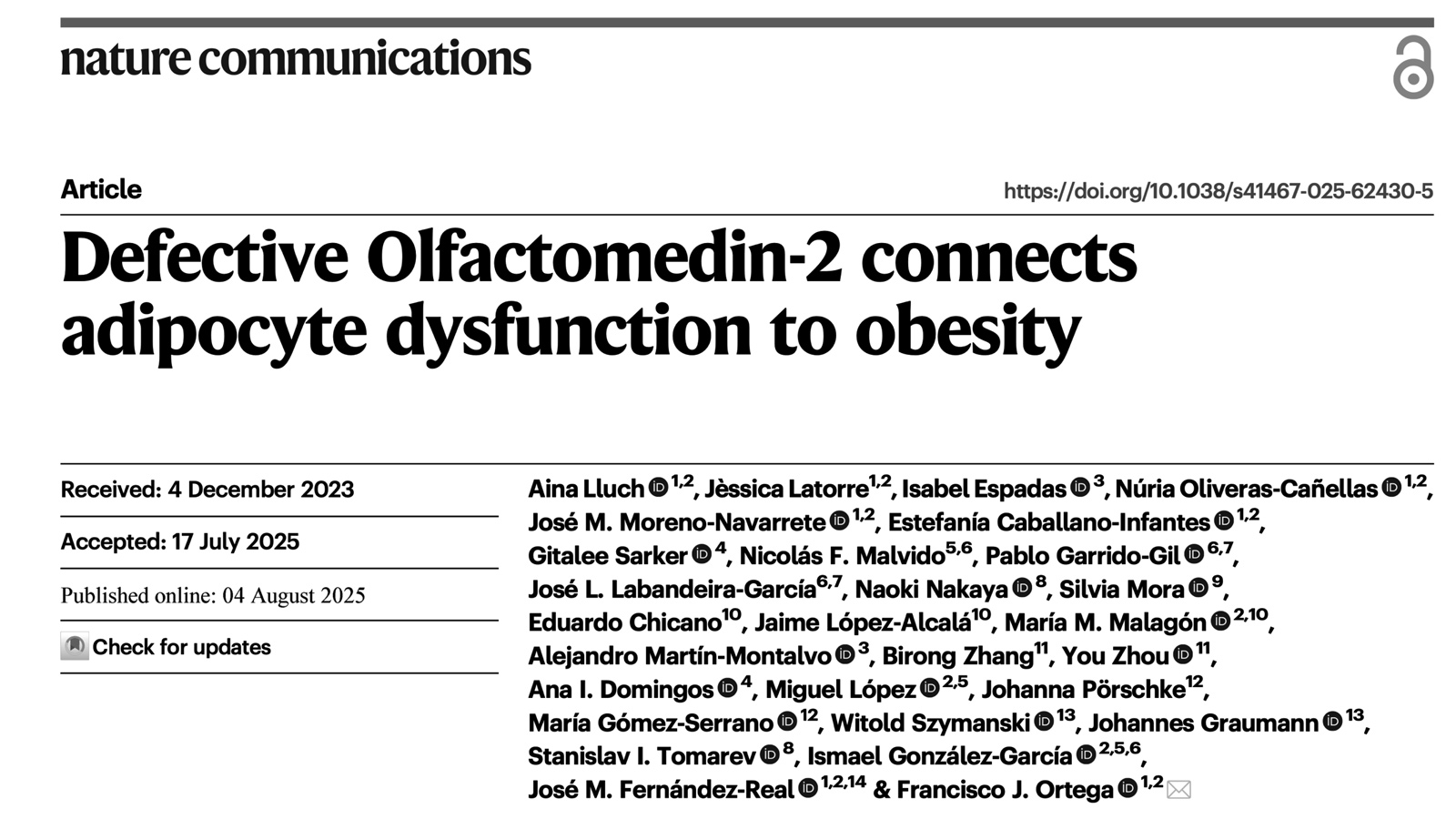New Challenges in Research on Adipose Plasticity
“ADIPOBROAD” is a research network devoted to establish multidisciplinary research on adipose tissue plasticity. With the firm purpose of sharing knowledge, access to biological models of basic research and patient samples, ADIPOBROAD is intended to make a qualitative leap in the understanding of adipose plasticity and its pathophysiological implications. In ADIPOBROAD, all members work in close collaboration with a common purpose and with high complementarity.
Key to ADIPOBROAD is the promotion of coordinated research on adipose plasticity applicable to emerging global health challenges, ranging from global warming, gender differences in adipose-related health issue, or adiposity in aging, among others, many of which have not traditionally been addressed from the perspective of adipobiology.


LATEST NEWS
On the occasion of the completion of AEI funding for the ADIPOBROAD network, a final meeting was held in Toledo to review the Network’s activities and future perspectives, with most members attending in person and others participating online. The success of the activities carried out was confirmed, as evidenced by the number and quality of joint publications as well as the collaborative projects promoted, together with the suitability of continuing the Network by accessing additional funding mechanisms. Likewise, in coordination with SEEDO, an ADIPOBROAD symposium was held focusing on new emerging aspects in adipose tissue research.
The research, conducted by members of the ADIPOBROAD teams in Girona (led by J.M. Fernñandez-Real), Santiago de Compostela (led by Miguel López), and Córdoba (led by María del Mar Malagón), reveals a critical role for OLFM2 in adipocyte biology. Their findings support a causative link between reduced levels of OLFM2 in adipose tissue and the development of obesity.
Taking advantage of the attendance of multiple members of the Adipobroad Network at the 32nd European Congress on Obesity, the meeting "Adipose tissue in the context of obesity" was held with the participation of more than 25 members of the Network. Various collaborative research projects and initiatives were established during the meeting, focused on the importance of adipose tissue pathophysiology in obesity and associated pathologies.
On January 16 and 17, 2025, the ADIPOBROAD meeting took place in Faculty of Biology, University of Barcelona. ADIPOBROAD is a thematic research network supported by the Ministry of Science, Innovation, and Universities in Spain. This network brings together 12 research groups from Spain involved in various aspects of research on adipose tissue plasticity and its impact on health. The meeting included participation from all the network's groups and international guests, with more than 60 attendees. Multiple interdisciplinary and collaborative research areas in adipobiology were identified during the meeting.
The ADIPOBROAD network scientific meeting will be held on 16 and 17 January at the Faculty of Biology of the University of Barcelona. The meeting will feature scientific presentations by the research teams that are members of the network and guests from the ETH Zurich (Switzerland), the University of Toronto (Canada), and the Príncipe Felipe Research Institute (Valencia) (see attached program). Sessions are open to the scientific community.
ADIPOBROAD has established a collaborative initiative with the University of Barcelona, contributing to the postgraduate course titled “Molecular, Cellular, and Pathophysiological Bases of Obesity” as part of the Master's Program in Biomedicine. Interactive lectures were delivered in December 2024 by Dr D. Araujo ( University of Santiago de Compostela), Dr. G. Sánchez-Delgado (University of Granada, J. Ruiz node), A. Castells-Novau (University of Girona, JM Fernández-Real node), M. Todorcevic (Faculty of Pharmacy, UB, L. Herrero node), and FJ Osuna (Hospital Joan XXIII and IRB Pere Virgili, Tarragona, S. Fernández-Veledo node).
Several research teams from our network, led by MM Malagón, G. Fruhbeck, JM Fernández Real, L. Herrero and F. Villarroya, took advantage of the assistance at the 58th European Society for Clinical Scientific Meeting in Barcelona, at XV CIBERobn symposium in Zaragoza and at the 31st European Obesity Congress in Venice in May and June, to organize meetings among groups to plan and develop collaborative activities in the context of the ADIPOBROAD network.
CIBEROBN awards the research project "Molecular adaptations of human brown adipose tissue to overnutrition" with 50.000 euros funding, in the context of intramural collaborative projects led by junior research leaders. The project involves four ADIPOBROAD research teams: G. Sánchez-Delgado (J. Ruiz team, University of Granada), M. Romero (L. Herrero team, Faculty of Pharmacy, University of Barcelona), R. Cereijo (F. Villarroya team, Faculty of Biology, University of Barcelona), and M. López (University of Santiago de Compostela). The study will advance in knowledge on the role of brown adipose tissue in energy balance in response to food intake.
Dr. Gema Fruhbkeck is the organizer of "Session 3: Endocrinology and Metabolism" in the "58th Annual Scientific Meeting of the European Society of Clinical Investigation" (https://esci.eu.com/), to be held in Barcelona next June 5-9. The session will cover relevant aspects of research on adipose tissue plasticity in obesity.
The symposium was held in Santiago de Compostela last November. David Araujo, member of the Adipobroad network, led the scientific organization of the Symposium, and F.Villarroya, also from Adipobroad, participated with a presentation on adipose plasticity. The symposium covered clinical and basic science on lipodystrophy diseases, including the involvement of altered adipose plasticity.
Six teams of the Adipobroad network met at Seville to advance in the programming of forthcoming network activities on novel aspects of adipobiology research.
Adipose tissue coregulates cognitive function.
Oliveras-Cañellas N, Castells-Nobau A, de la Vega-Correa L, Latorre-Luque J, Motger-
Albertí A, Arnoriaga-Rodriguez M, Garre-Olmo J, Zapata-Tona C, Coll-Martínez C,
Ramió-Torrentà L, Moreno-Navarrete JM, Puig J, Villarroya F, Ramos R, Casadó-
Anguera V, Martín-García E, Maldonado R, Mayneris-Perxachs J, Fernández-Real
JM.Sci Adv. 2023 Aug 11;9(32):eadg4017. doi: 10.1126/sciadv.adg4017.
LATEST PUBLICATION

Aina Lluch , Jèssica Latorre, Isabel Espadas , Núria Oliveras-Cañellas, José M Moreno-Navarrete, Estefanía Caballano-Infantes, Gitalee Sarker, Nicolás F Malvido , Pablo Garrido-Gil, José L Labandeira-García, Naoki Nakaya, Silvia Mora, Eduardo Chicano, Jaime López-Alcalá, María M Malagón, Alejandro Martín-Montalvo , Birong Zhang, You Zhou, Ana I Domingos , Miguel López, Johanna Pörschke, María Gómez-Serrano, Witold Szymanski, Johannes Graumann, Stanislav I Tomarev, Ismael González-García, José M Fernández-Real, Francisco J Ortega.
PMID: 40759652 PMCID: PMC12322249 DOI: 10.1038/s41467-025-62430-5
Nat Commun. 2025 Aug 4;16(1):7154. doi: 10.1038/s41467-025-62430-5.
Defective Olfactomedin-2 connects adipocyte dysfunction to obesity.
Olfactomedin-2 (OLFM2) is a pleiotropic glycoprotein emerging as a regulator of energy homeostasis. We here show the expression of OLFM2 to be adipocyte- specific and inversely associated with obesity. OLFM2 levels increase during adipogenesis and are suppressed in inflamed adipocytes. Functionally, OLFM2 deficiency impairs adipocyte differentiation, while its over-production enhances the adipogenic transformation of fat cell progenitors. Loss and gain of function experiments revealed that OLFM2 modulates key metabolic and structural pathways, including PPAR signaling, citrate cycle, fatty acid degradation, axon guidance and focal adhesion in 3T3 cell lines and primary human adipocytes. On the molecular level, OLFM2 deficiency in differentiated adipocytes predominantly downregulates genes involved in cell cycle. Extending these findings in vivo, both whole-body Olfm2 knockout and adipose-specific Olfm2 depletion in mice resulted in impaired adipose cell cycle gene expression, with the latter also displaying fat mass accretion and metabolic dysfunction. Collectively, our results underscore a critical role for OLFM2 in adipocyte biology, and support a causative link between reduced adipose OLFM2 and the pathophysiology of obesity.
CONTACT US
- 934021525 / 607922244
- fvgombau@gmail.com
- Department of Biochemistry and Molecular Biomedicine.
Faculty of Biology (UB)
Avda. Diagonal, 645
Edifici nou Pl. -1
08028 Barcelona













